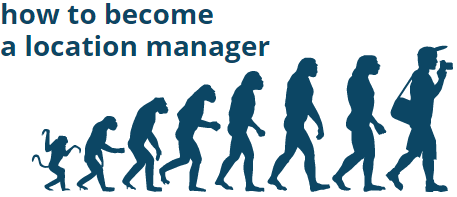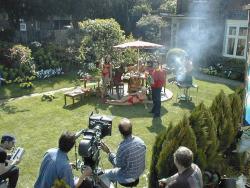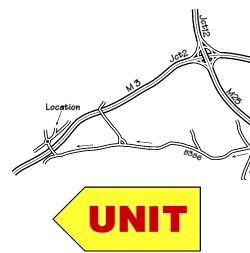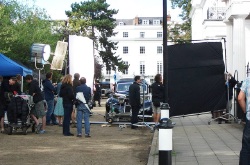
|


|
| search by keyword | ×
|
 |   There are those who visit our website who get the idea into their heads that they quite fancy becoming a Location Manager. We are reminded of Mr Punch's advice for those about to get married: "don't!" For those of you brave (or foolhardy) enough to want to ignore this advice, here's a page which may be of some assistance. The job of the Location Manager can be difficult, frustrating, tedious and exasperating, and all that's likely to be within the same day. It can also be hugely exciting, deeply fulfilling, and get you into situations and experiences that few other humans would encounter. In short, there's nothing else like it, but don't ever, ever expect it to be easy.  Let's start with the job description.
You're likely to come across the terms location scout and location manager, what's the difference?
Quite often you'll find that people embarking on this career will start working as a location scout
for an experienced location manager.
This means that they'll start off doing the donkey work of finding locations for someone else.
The Location Manager is the person who will be liaising directly with the film production company or
advertising agency, and may be working
closely with the film's Director, taking decisions not only about the right location, but also the logistics of making that location work.
The Location Scout may be convinced that he or she has found the perfect spot, but it's not always the perfect spot that is the most practical:
when there's an entire unit to be moved into position, decisions are made about the distances involved, the availability within the schedule
on that day of the stars, key personnel, special equipment, etc. etc.
The Location Manager will be closely involved with the rest of the production team dealing with many such logistical problems and
their solutions - perhaps none of which may have been known to the Location Scout when first they started scouting.
Let's start with the job description.
You're likely to come across the terms location scout and location manager, what's the difference?
Quite often you'll find that people embarking on this career will start working as a location scout
for an experienced location manager.
This means that they'll start off doing the donkey work of finding locations for someone else.
The Location Manager is the person who will be liaising directly with the film production company or
advertising agency, and may be working
closely with the film's Director, taking decisions not only about the right location, but also the logistics of making that location work.
The Location Scout may be convinced that he or she has found the perfect spot, but it's not always the perfect spot that is the most practical:
when there's an entire unit to be moved into position, decisions are made about the distances involved, the availability within the schedule
on that day of the stars, key personnel, special equipment, etc. etc.
The Location Manager will be closely involved with the rest of the production team dealing with many such logistical problems and
their solutions - perhaps none of which may have been known to the Location Scout when first they started scouting.
 So what does a location scout actually do? Well, here's one of the things that make the job a constant challenge: you never know.
Each time a scout is asked to find something, it's invariably something new and quite different to the previous assignment.
Commonplace locations, let's say kitchens or public parks, are very well covered by Location Libraries
(such as, ahem, Location Works!),
so if the needs are simple, why not keep the solution simple? However the world of filming
(and photography) is the world of imagination,
so for each new script, each new concept, there's a new question needing an answer.
For example, the kitchen might need a view through the window to a swimming pool, or the script might demand that the public park
has a south-facing slope overlooking a lake. No matter how good library photographs may be, there will always be occasions when a
location needs to be re-photographed to demonstrate its suitability.
So what does a location scout actually do? Well, here's one of the things that make the job a constant challenge: you never know.
Each time a scout is asked to find something, it's invariably something new and quite different to the previous assignment.
Commonplace locations, let's say kitchens or public parks, are very well covered by Location Libraries
(such as, ahem, Location Works!),
so if the needs are simple, why not keep the solution simple? However the world of filming
(and photography) is the world of imagination,
so for each new script, each new concept, there's a new question needing an answer.
For example, the kitchen might need a view through the window to a swimming pool, or the script might demand that the public park
has a south-facing slope overlooking a lake. No matter how good library photographs may be, there will always be occasions when a
location needs to be re-photographed to demonstrate its suitability.
Essential equipment...
for a location scout includes a good camera, a clean driving licence, a mobile phone, satnav, a compass and the ability to hop into a car and drive off into the yonder at potentially very short notice. Practicalities:
Examples
Here's some examples of (more or less) typical location scouting exercises: Location: two back-gardens with a low fence between them.
Script: one householder is envious of his next-door neighbour's new lawn mower.Scouting: select an area where there are likely properties, and go knocking on doors. Advice: be sure to have identification with you, a copy of the script, and smile a lot. Potential location owners will need reassurance that you are not a mad axe-man before they'll let you into their house. Location: a school playground.
Script: a cuddly-toy monster is handing out a new range of chocolate bars.Scouting: contact the relevant education authorities and governmental bodies, ask them to suggest possible schools, send over the script, then make appointments with each school. Advice: never go cold-calling, the school staff will treat you with justifiable suspicion and you won't be allowed in.
Location: a hair-pin bend on a mountain road.
Script: the latest sports car showing off its road-holding.Scouting: establish which parts of the country (or the world?) have the right landscape and topography, ensure your clients have the budget to go there, get the most detailed maps of the area, study them at length, mark up areas of interest, and only then go there. Advice: you may be able to scramble up a slope, can the entire camera team? Does the road need to be closed off for the filming/photography? Who will give permission, and are they likely to? Who owns the land? Where will the sun be when the shot needs to be taken? Take lots and lots of photos from every angle - the cost of the photography is an awful lot cheaper than the cost of you having to go back again to re-photo. Location: a Long Gallery in a Jacobean country mansion.
Script: a scene in a period drama.Scouting: find the reference books and/or a location library/film commission that will help you draw up a list of likely properties, send them a copy of the script, make appointments. Advice: are you sure you know what a Long Gallery is? Could you tell a Jacobean mansion from a Victorian one? When is the drama set? Did they have central heating radiators in those days? Location: a laundrette in a busy street.
Script: an establishing shot in a comedy TV series.Scouting: find out where the unit is based, and how far they are prepared to travel. Get a good map of the local area and work out a schedule and itinerary. Advice: you're very likely to be dealing with the manager, and will need to wait to speak to the owner. You may find the perfect location, but have to re-visit later in the day before you can take snaps. Location: a white-sand beach, blue skies, blue seas, with leaning palm trees.
Script: young beautiful people are drinking a new kind of alco-pop.Scouting: where are the white beaches? Where is the weather perfect? Where do the palm-trees lean? You may need to island-hop: get airline schedules. Advice: keep on dreaming! Jobs like this don't come up all that often, sad to say.
Having tried you out as a location scout, the location manager may trust you to start dealing with production companies
directly, and give you the experience of overseeing a shoot. This is a chicken-and-egg dilemma: you can't know how to
location manage until you have already done so; there is no subsititute for experience.
 Once the location has been chosen, the first thing is to deal with contractual matters, getting a Location Agreement signed
by both the Location Owner and the Producer or Photographer. The Location Agreement need not be a complicated document,
but it's important that you properly understand the concepts of Liability and Indemnity, and can explain them to the Owner.
Next you must ensure that all relevant permissions are in place, and that everyone involved - and everyone who may be
inconvenienced - has been given plenty of notice of the planned activities. If the unit is to be parked in a public street,
the local authority, and parking department, will need to have been informed and given their permission.
Some authorities can react quickly to a filming request, others will need a week or so, and this can affect the choice of location.
The police should also be informed, and although (in the UK anyway) they never actually give permission, they will need to be
satisfied that you are not going to cause a danger to the public, and that nothing you will be doing will prevent the emergency
services gaining access at any time. You must, as a courtesy, letter-drop all local residents and businesses informing them of
the shoot, and giving them your mobile number as a liaison.
Once the location has been chosen, the first thing is to deal with contractual matters, getting a Location Agreement signed
by both the Location Owner and the Producer or Photographer. The Location Agreement need not be a complicated document,
but it's important that you properly understand the concepts of Liability and Indemnity, and can explain them to the Owner.
Next you must ensure that all relevant permissions are in place, and that everyone involved - and everyone who may be
inconvenienced - has been given plenty of notice of the planned activities. If the unit is to be parked in a public street,
the local authority, and parking department, will need to have been informed and given their permission.
Some authorities can react quickly to a filming request, others will need a week or so, and this can affect the choice of location.
The police should also be informed, and although (in the UK anyway) they never actually give permission, they will need to be
satisfied that you are not going to cause a danger to the public, and that nothing you will be doing will prevent the emergency
services gaining access at any time. You must, as a courtesy, letter-drop all local residents and businesses informing them of
the shoot, and giving them your mobile number as a liaison.
 Next you need to get a set of directions prepared. In the UK this is often referred to as a Movement Order,
this being a military term for, er, a set of directions. You should make absolutely sure that these directions are correct,
for all the vehicles (larger vehicles may not be able to take the same route you took in your car).
The only way to be sure is to cover the ground yourself (do NOT rely on everyone having a SatNav),
and ideally make use of this knowledge in your directions:
for example "after the third set of traffic lights there is the Beech Tree public house on the right".
The Movement Order should include a map with the location clearly marked.
On the day of the shoot, the location manager is quite likely, where this is allowed,
to stick up "Unit Signs" on lamp-posts at the last few junctions. The reason for going to such lengths is
to ensure that NOBODY gets lost, or takes a wrong turning and turns up late.
Every person on a film crew is important to the shoot, and there's a lot of money being spent in a short period of
time - it's critical to the budget that everybody is there on time.
Next you need to get a set of directions prepared. In the UK this is often referred to as a Movement Order,
this being a military term for, er, a set of directions. You should make absolutely sure that these directions are correct,
for all the vehicles (larger vehicles may not be able to take the same route you took in your car).
The only way to be sure is to cover the ground yourself (do NOT rely on everyone having a SatNav),
and ideally make use of this knowledge in your directions:
for example "after the third set of traffic lights there is the Beech Tree public house on the right".
The Movement Order should include a map with the location clearly marked.
On the day of the shoot, the location manager is quite likely, where this is allowed,
to stick up "Unit Signs" on lamp-posts at the last few junctions. The reason for going to such lengths is
to ensure that NOBODY gets lost, or takes a wrong turning and turns up late.
Every person on a film crew is important to the shoot, and there's a lot of money being spent in a short period of
time - it's critical to the budget that everybody is there on time.
The location manager is always the first to arrive on the shoot, and usually the last to leave.
The first task of the day will be parking up the unit. You should already have an idea where each vehicle is going to go,
and be ready to help them into position when they arrive. The very first to arrive is often the catering van: they will
need a source of water, and will create a lot of refuse during the day which needs to be stored safely and properly
disposed of afterwards - and that is your job!
You can't learn from a text-book how to park up a film unit, and it's never easy.
A film unit is a mobile factory, with different departments each vying to be parked closest to the location.
Diplomacy and tact is the order of the day.
 Once everyone is in position, the location manager needs to be on hand for the rest of the day liaising between the
crew and the location owner. You will be expected to know everything about the local area, such as where the nearest
shops are, nearest hardware store, nearest anything. If the police turn up, it is you that is responsible for looking
after them (which hopefully will be no more onerous than ensuring they get a cup of tea from catering).
The location manager also needs to have a working knowledge of Health & Safety regulations, keeping an eagle eye
out for trailing cables that might trip a passer-by, that lamps are securely tethered etc.
It's a good idea if you have a basic training in First Aid, or know who else on the crew is qualified to deal with
minor injuries, and also where the nearest Accident & Emergency hospital department is.
Once everyone is in position, the location manager needs to be on hand for the rest of the day liaising between the
crew and the location owner. You will be expected to know everything about the local area, such as where the nearest
shops are, nearest hardware store, nearest anything. If the police turn up, it is you that is responsible for looking
after them (which hopefully will be no more onerous than ensuring they get a cup of tea from catering).
The location manager also needs to have a working knowledge of Health & Safety regulations, keeping an eagle eye
out for trailing cables that might trip a passer-by, that lamps are securely tethered etc.
It's a good idea if you have a basic training in First Aid, or know who else on the crew is qualified to deal with
minor injuries, and also where the nearest Accident & Emergency hospital department is.
At the end of the filming day, it is the location manager's responsibility to see that the location is left in good condition, that all refuse has been taken off site, and that the location owner is happy with the condition of his/her property. If there has been any damage, you may be the one who has to negotiate making good, and/or compensation.
So what qualities does a good location manager need?
Where to begin?
As with any job in the film business, it is notoriously difficult to get started, and there are
lots of other people knocking on the same doors. Dogged determination may be required!
It is unrealistic to believe that you can simply introduce yourself to a film producer and be out scouting the next day.
It's best to start by offering your services to an established location manager, or location company, and gain
experience that way. In the first instance, get a hold of a directory which lists location managers: in the UK
these include
Kay's,
The Knowledge,
KFTV, etc.
Click on the above links to take you to their web pages.
Your local film commission should also be able to help: see our links page.
You should prepare a concise, articulate Curriculum Vita that includes all your relevant qualifications, knowledge and experience.
Make triple-sure there are no spelling or grammatical errors (the location manager's job consists of emailing,
frequently, to people whose willing co-operation is required). After writing a letter, or sending an e-mail,
see if you can't get to visit the recipient; you will never get the job on the basis of your CV alone.
Finally...
Location Works is one of the busier location companies in the UK, and we do get inundated with
job applications and CV's. By all means get in touch with us, but we're more than likely just to send you to
this page on our web site!
Locations for filming, photography and events: contact us on 0800 334 5505 or email for further details. 
|